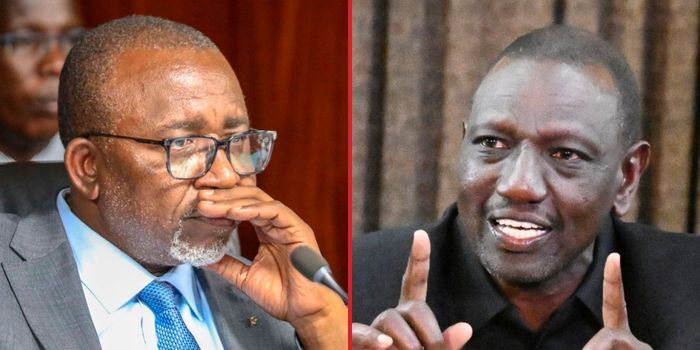Linturi Reveals Inner Circle Behind Government Appointments in Kenya Kwanza
Former Agriculture Cabinet Secretary Mithika Linturi has revealed that Cabinet Secretaries in President William Ruto’s government often lack real decision-making power, especially when it comes to appointing people to public offices.
His claims support earlier sentiments shared by former Attorney General and now Cabinet Secretary Justin Muturi, who also hinted at interference in government appointments.
Speaking during an interview on Weru TV on Sunday, Linturi shared a personal experience where an appointment he had made at the Pyrethrum Company of Kenya (PCK) was reversed just days later, without his knowledge or consent.
He said he had made a formal decision on a Wednesday to extend the tenure of the company’s director, but by Friday, a gazette notice had been published canceling the appointment.
“I had used my office to inform the director that his term was being extended, only to later find out that a new gazette notice had revoked the appointment. I wasn’t even aware of it,” Linturi explained.
He went further to state that Cabinet Secretaries do not have actual control over appointments as the public is made to believe. “CSs don’t have any power.
They don’t even sign the appointments. Yet, gazette notices are printed with our names, as if we made those decisions ourselves,” he said.
Linturi gave another example involving his close friend, Professor Simon Thuranira, who currently serves as the Vice Chancellor of Meru University of Science and Technology.
At one point, Thuranira was removed from his role as the chairperson of Bukura Agricultural College, and the official record falsely showed that it was Linturi who had made the decision.
“That was the first time I officially complained. I even wrote a letter to the Government Printer, making it clear that I had nothing to do with that removal,” Linturi said.
He added that he had to raise the issue with President Ruto, telling him that such moves were damaging his reputation back home in Meru.
“I told my boss that I have a constituency in Meru, and it’s not right for people to keep getting fired in my name, especially when I’m not even aware of it,” he emphasized.
Linturi said he later addressed the issue with the Head of Public Service, Felix Koskei, but despite his efforts, nothing changed. His repeated objections created a tense relationship between him and Koskei.
“My relationship with Felix Koskei was terrible. He never listened to me. I kept questioning the way government appointments were being handled, and that didn’t sit well with him,” Linturi noted.
He recalled another instance where he tried to renew the contract of Kubai, who was heading the Agricultural Finance Corporation (AFC).
According to Linturi, even though all the necessary paperwork had been prepared, Koskei refused to approve the renewal.
“He told me to appoint someone else instead. But I stood my ground and said I would rather be fired than appoint someone I didn’t believe in,” Linturi revealed.
Linturi also raised concerns about tribal favoritism in some government institutions. He claimed that certain parastatals had a disproportionate number of employees from a single ethnic group.
In one case, he said out of 40 employees, 26 were from the same tribe, raising serious questions about ethnic balance and fairness in public service appointments.
His revelations point to deeper issues within the government, where key decisions seem to be made by a small group of influential individuals, often referred to as the president’s “kitchen cabinet,” leaving Cabinet Secretaries with little to no authority over their own ministries.
Join Our Political Forum official 2025 WhatsApp Channel To Stay Updated On time https://whatsapp.com/channel/0029VaWT5gSGufImU8R0DO30


